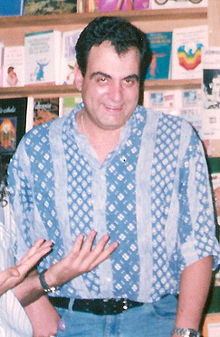Jorge Lanata

Jorge Lanata (born 12 September 1960 in Mar del Plata) is an Argentine journalist and writer, born in Mar del Plata in 1960. He founded the leftist Argentine newspaper Pagina 12 in 1987 and co-founded the daily newspaper Crítica de la Argentina on March 2, 2008, and was its director until April 4, 2009.[1] His grandfather was Agustín Lanata, a well known footballer of the second decade of the 20th century.[2]
He started his career at 14 writing short news for Radio Nacional. Since 1977 he was a collaborator of several written media: Siete Días magazine, Clarín Revista. In 1983 he entered the news program of Radio Belgrano and made investigation reports for Sin Anestesia show, while collaborating with Humor, El Periodista and El Porteño magazines.
He was a founder of the Cooperativa de Periodistas that purchased the monthly magazine El Porteño, and was its editor in chief. In 1987 he founded Página 12 newspaper, and was its director until 1994. From 1990 until 1993 he hosted Hora 25 radio show, and between 1994 and 1996 Rompe/Cabezas (1995 Martín Fierro Award for best journalistic show in radio). He regularly published in media abroad (Miami Herald, El Espectador -Colombia-, among others).
He directed Veintitrés (Twenty-Three) magazine. He hosted Día D (D-day), a very popular TV show that achieved Martín Fierro award for best journalistic television show in 1996 and 1997, and Clarín Award for best TV show in 2003. Lanata himself achieved a Marín Fierro Award for Best Journalistic TV Host in 1996, 1997 and 2004.
He produced the documentary series BRIC: The New World in 2010.
In 2012 Lanata came back to TV with a new show called "Periodismo para todos". The 2013 edition worked with the case of the K money trail.
In December 2015 the Citizen's Lab, at the Munk School for Global Affairs, at University of Toronto, identified Lanata and several other South American opposition figures as having their cellphones targeted for extrajudicial surveillance by government associated hackers.[3]
Books and literature
In 1987 he published El nuevo periodismo (The New Journalism) as a compiler, and the following year La guerra de las piedras (War of the Stones, report). He also published Polaroids (short stories, 1991), Historia de Teller (novel, 1992), Cortinas de Humo (Smokescreens, 1995, in collaboration with American journalist Joe Goldman), an investigation on the 1994 terrorist attack to the Argentine Israelite Mutual Association (AMIA), and Vuelta de página (Turn of the Page, 1997), a collection of press articles written throughout his whole journalistic career. One of his short stories, "Oculten la luna" ("Hide the Moon"), was included in Prospero's Mirror (Curbstone Press of united States). His books Argentinos 1 and Argentinos 2 sold more than 340.000 copies, and were edited in Spain in a single volume. In 2004 he published ADN, mapa genético de los defectos argentinos (DNA, Genetic Map of Argentine Faults, essay).
Films
In October 2004, he premiered Deuda (Debt), a documentary on foreign debt and his opera prima in cinema discussing bureaucratic corruption and ignorance.
Awards
- 2013 Tato award as best journalist hosting[4]
- 2013 Martín Fierro Awards
- Best male journalist[5]
- 2015 Martín Fierro awards
- Golden Martín Fierro Award
- Best male journalist (for Periodismo para todos)
References
- ^ http://www.clarin.com/diario/2009/04/04/sociedad/s-01890973.htm
- ^ Agustín José Lanata, Historia de Boca
- ^
Frank Bajak (2015-12-15). "South American hackers attacking journalists, opposition, U of T team finds". Toronto Star. Retrieved 2016-01-09.
Researchers said Packrat sent a top Argentine journalist, Jorge Lanata, the identical virus that Nisman received a month before his death.
- ^ "Todos los ganadores de los premios Tato 2013" (in Spanish). La Nación. December 3, 2013. Retrieved December 2, 2013.
{{cite web}}: Unknown parameter|trans_title=ignored (|trans-title=suggested) (help) - ^ "Todos los nominados a los Martín Fierro 2014" (in Spanish). La Nación. April 15, 2014. Retrieved April 14, 2014.
{{cite web}}: Unknown parameter|trans_title=ignored (|trans-title=suggested) (help)
- 1960 births
- Living people
- Argentine journalists
- Argentine newspaper founders
- Argentine magazine founders
- Investigative journalists
- People from Mar del Plata
- Argentine people of Italian descent
- Argentine people of Spanish descent
- Argentine male writers
- Argentine television personalities
- Argentine radio personalities
- Argentine film directors
- Golden Martín Fierro Award winners
